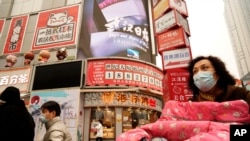With fanfare unusual for a documentary film, “Days and Nights in Wuhan” premiered this weekend throughout China.
A co-production of official state media and the Hubei Propaganda Department, the film released Friday marks the first anniversary of the lockdown to contain a new and frightening virus in Wuhan, the city where COVID-19 first took hold.
With shots of heroic medical personal tending patients and empty streets, the film chronicles the suffering and sacrifices of the city’s 11 million residents.
The documentary is the latest effort by Beijing to control the official narrative and deflect blame about the origins of the coronavirus that has gone on to kill more than 2 million people worldwide, upend the global economy and forever alter whatever most people see as normal in their daily lives.
But one year on, not all Wuhan residents remember the lockdown as 76 triumphant days in which the state and the citizens vanquishing a virus, as the documentary suggests.
Many of those Wuhan residents who survived continue to demand accountability from local authorities about the initial cover-up in December 2019, and subsequent abuses such as intrusive surveillance of citizens.
Zhang Yi, 55, dissident
China is one of the front-runners for COVID-19 vaccine research, although its Sinovac is less effective than initially described. Beijing is preparing to vaccinate 50 million people before the Lunar New Year holiday that begins February 11. After the festivities conclude February 17, the government plans to roll out an even wider free immunization program.
But there is resistance.
“I’m not going to get the Chinese vaccine,” said Zhang Yi. “At least around me, everyone says they are unwilling to take it.”
He pointed out that his decision to wait is based on what he said is China’s poor vaccine safety record. The country experienced one of its worst public health crises in 2018, when a major vaccine producer violated accepted standards in making at least 250,000 doses of vaccines used in children.
“I think the country’s leaders should take the vaccine first,” Zhang said, “but who knows, they might actually be using Pfizer’s rather than the domestic vaccines.”
Months after China began its vaccine program, the U.S. Food and Drug Administration gave the first emergency use authorization (EUA) for a vaccine for the prevention of COVID-19 to Pfizer Inc.
After Zhang Yi’s interview with VOA last year, he was forced to travel ahead of the lockdown anniversary. Activists coined a phrase “being traveled” to describe the method of muzzling dissent.
Chen Chen, 27, employee of a Chinese state-owned enterprise
Chen said at the beginning of the lockdown, like everyone else, she tracked the increasing death toll day by day. She accused local authorities of covering up what happened in the earliest days of the outbreak.
Now she said she thinks the government did a fantastic job.
"In the beginning, everyone blamed the government for suppressing information, leaving us unprepared for such a severe lockdown. But I think they did a great job making up for those mistakes,” Chen told VOA.
She added that work resumed last April, businesses resumed last May, and in October, tourists packed Wuhan during the National Day holiday season, responding to government travel subsidies.
“The hardest time in Wuhan has passed,” Chen said, “I think we have recovered completely.”
Her aunt, who works in a hospital and has recovered from COVID-19, told her that medical personnel have started wearing protective gear again as coronavirus reemerges in China ahead of the Lunar New Year travel season.
Yet Chen said she’s not worried.
“Now people say Wuhan is the safest city. You won’t find a single person on the street without a mask," she told VOA. "If you don’t wear a mask, it's like you are not wearing clothes.”
Chen said her parents remain worried.
"My parents are in their 50s, and they have never encountered anything like the lockdown before. They described it as a nightmare, and they often say they are afraid Wuhan will be locked down again.”
Zhang Hai, 51, former real estate professional
Zhang Hai lost his father to COVID-19 last February. His father, Zhang Lifa, was a veteran of the People’s Liberation Army, who had spent decades working on China’s nuclear weapons program.
Zhang and his father, both Wuhan natives, were living in Guangzhou then, and traveled to Wuhan only for surgery on the older man’s leg. At the time, local officials were playing down the risk of human-to-human transmission. Zhang said that if he and his father had known what was really going on at the time, they would not have gone to Wuhan.
Zhang filed a lawsuit in June against the local government demanding accountability. Since then, he has been constantly harassed by the police. He told VOA that authorities blocked his social media accounts six times, monitored his activity on the messaging app WeChat and tapped his cell phone. He was threatened that if he doesn’t “stop talking,” he would be thrown to jail.
“They even followed me when I went back to Wuhan. After I moved to another apartment, three policemen reviewed the surveillance camera footage of the neighborhood,” he told VOA.
“I am extremely angry. I’m just an ordinary citizen. I’m not a spy. I’m not anti-party,” he said referring to the ruling Chinese Communist Party. “My demand for accountability is a patriotic act.”
Zhang is one of the few outspoken citizens among those who lost loved ones in the pandemic.
“People are silent, that doesn't mean their anger has disappeared,” he said.
“The Chinese government’s narrative that it has won the COVID-19 ‘war’ is conditioned on silencing those who speak out about failings in the government’s pandemic response and abuses committed under the pretext of stopping the spread of the virus,” said Maya Wang, a senior China researcher at Human Rights Watch.
Lin Yang contributed to this report that originated on VOA Mandarin.




